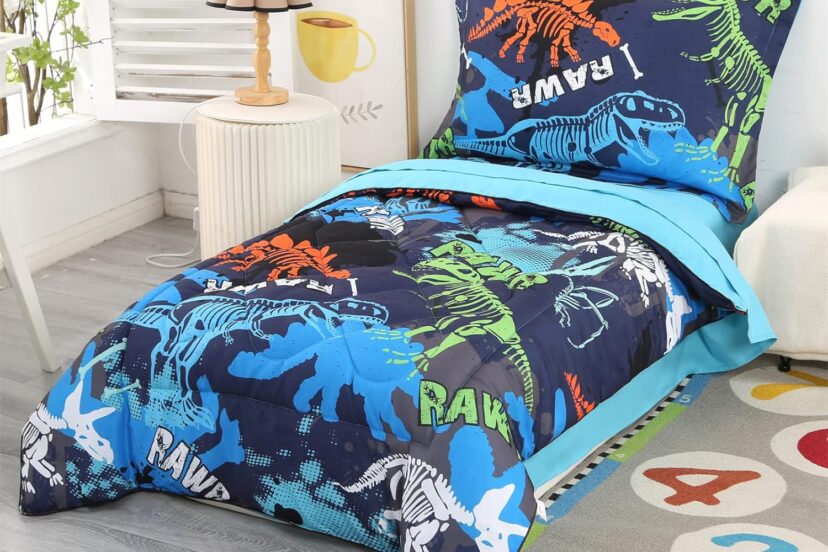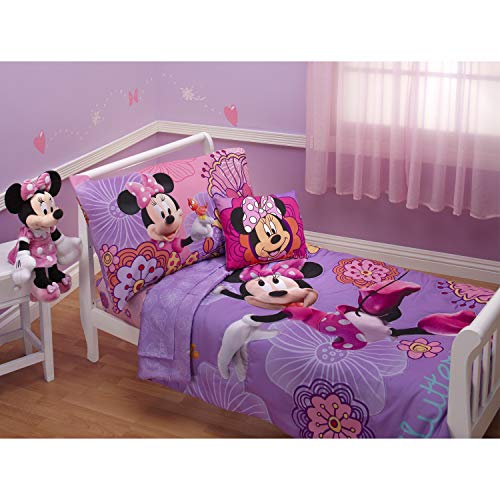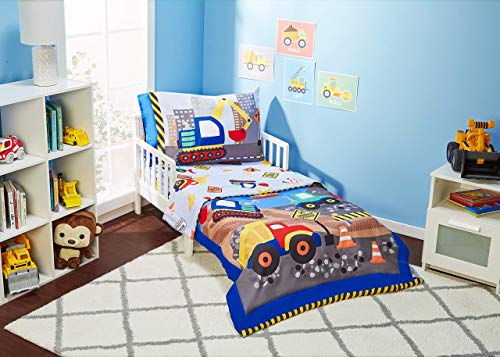Toddler Bedding: A Comfortable Guide for Young Sleepers
I’m a parent just like you, and I’ve faced the delightful chaos of finding the perfect toddler bedding for my little munchkin. Through all the late-night shopping sprees and reading countless reviews, I’ve gathered some wisdom I’d love to share. So, let’s jump right in, shall we?
Selecting the right toddler bedding isn’t just about picking out cute designs and patterns; it’s about ensuring our toddlers sleep with the utmost comfort and safety. As parents or caregivers, we’re the stewards of our child’s sleep, which plays a foundational role in their overall development. Just think about how you feel after a restless night—groggy, irritable, and just not on your A-game. It’s the same for toddlers, but magnified, as their little bodies and minds are still developing.
Investing in the right bedding becomes an investment in their well-being. With so many options on the market, from materials to designs, the task can seem overwhelming. But with a little knowledge and guidance, it can be an enjoyable process, setting your child up for many nights of peaceful sleep.
Why Toddler Bedding is Important
Toddler bedding is not just a piece of fabric that covers your child while they sleep. It’s a protective shield, a comfort zone, and a tiny universe where they rejuvenate after a long day of discoveries and adventures. Ensuring the right bedding means you are offering a consistent environment, contributing to their physical comfort and mental reassurance.
Another facet is safety. Toddlers have specific needs that differ from adults. For instance, an overly soft pillow might pose a suffocation risk. Similarly, sheets that easily come undone can become tangled hazards. The right bedding ensures your child is safe as they sleep, giving you peace of mind in return.
Transition from crib to bed
This transition is a significant milestone in a toddler’s life. It symbolizes a step towards independence. While it can be an exciting time, it can also be daunting for both the child and parents. The familiarity of the crib is replaced with the vastness of a bed. The right bedding can make this shift easier, providing a familiar texture and comfort amidst the change.
Moreover, the bed can seem enormous to a little one used to the confines of a crib. Fun and comforting toddler bedding sets can make the bed feel more inviting. Themes or patterns that resonate with your child’s interests can make them eager to jump in and snuggle up, turning a potential challenge into an anticipated adventure.
- Includes Comforter, Sheet Set – Fitted + Top Sheet + Reversible Pillowcase
Enhancing sleep quality
The quality of sleep is directly influenced by the environment we sleep in. For toddlers, who are more sensitive to discomfort, the right bedding plays an even more vital role. Comfortable sheets that regulate temperature ensure they don’t wake up too hot or too cold. Breathable fabrics reduce sweat and the risk of rashes.
Additionally, our little ones’ active imaginations can sometimes make bedtime a challenge. Bedding with their favorite colors or characters can make the bed a more appealing place, creating a positive association with bedtime. In the end, the more inviting the bed, the easier it will be to establish and maintain a consistent sleep routine, ensuring your toddler gets the restorative sleep they need.
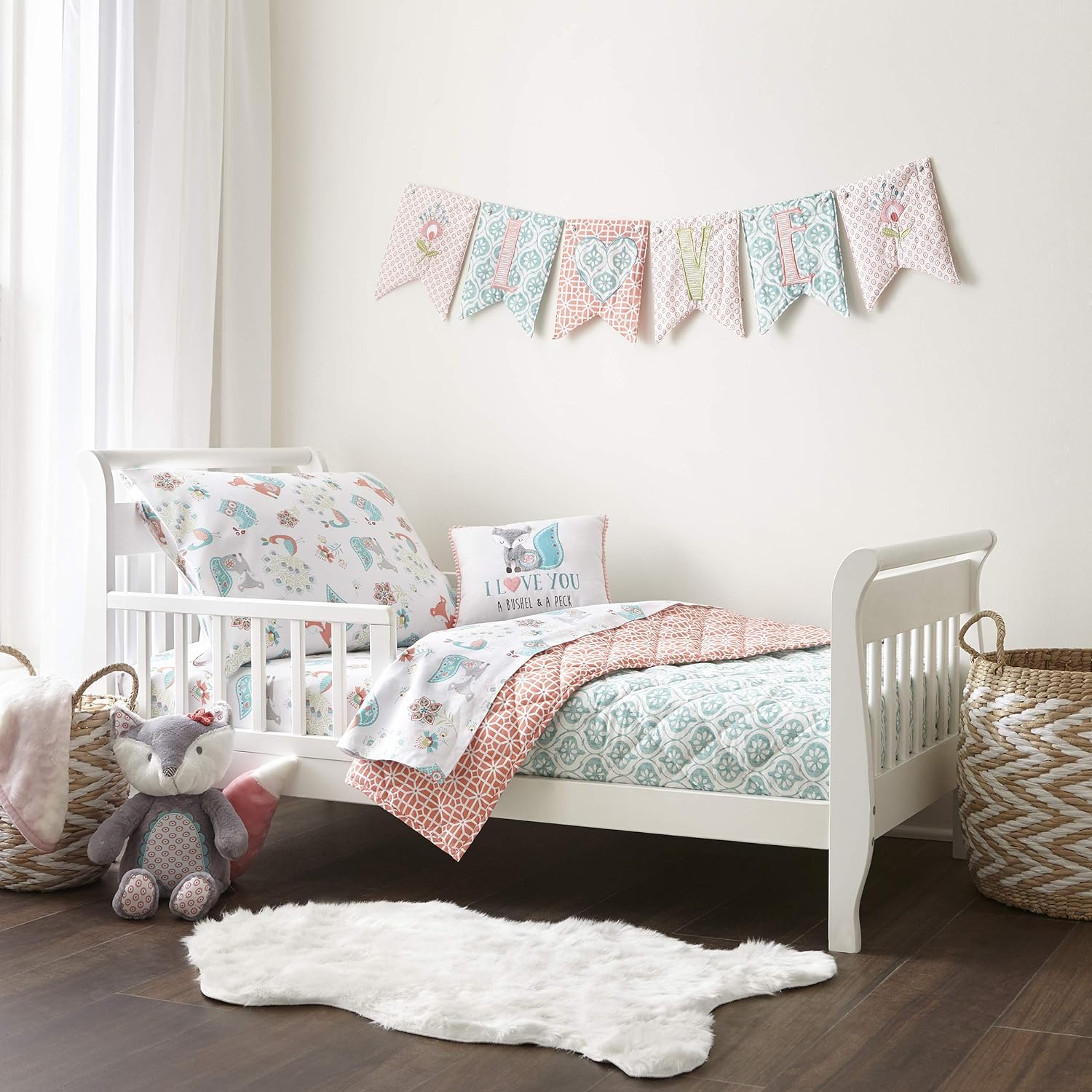
Elements of the Perfect Toddler Bedding Set
The journey of picking out the perfect toddler bedding set is akin to fitting together the pieces of a puzzle. Each component plays its own crucial role, ensuring the little one’s comfort and safety. It’s more than just about aesthetics; it’s a blend of functionality, comfort, and style. Let’s delve deeper into the essential components that make up the perfect toddler bedding set.
Fitted Sheets
Every parent knows the hassle of trying to keep a bedsheet in place, especially with a toddler who seems to move in every conceivable direction while asleep. Fitted sheets are the unsung heroes in this story. They snugly wrap around the mattress, staying put despite all the tossing and turning. When selecting a fitted sheet, it’s essential to consider the fabric. Breathable materials like cotton can help regulate temperature, ensuring your toddler doesn’t wake up sweaty in the middle of the night. Additionally, the elastic should be robust and durable, ensuring that the sheet remains in place without being overly tight or constricting.
Another crucial aspect is the sheet’s texture. Toddlers have sensitive skin, and a soft, smooth sheet can prevent irritations and enhance the overall sleep experience. Remember, it’s the sheet that will be in direct contact with your child’s skin for hours every night, so never compromise on its quality.
Comfortable Quilts
Quilts are like warm hugs for your toddler. They provide warmth without the weight, making them ideal for ensuring a cozy sleep environment. When shopping for quilts, consider the filling material. Natural fillings like down or cotton are breathable, ensuring warmth without causing overheating. Synthetic fillings can also be a good choice, especially if they are hypoallergenic.
Another factor to consider is the quilt’s weight. While it should be warm, it shouldn’t be too heavy to make your toddler feel constricted. The quilt’s design and pattern can also make bedtime more enticing. A quilt with your child’s favorite colors or characters can make them look forward to bedtime, making your nightly routine a tad bit easier.
Soft Pillows
Choosing the right pillow is a balance of softness and support. While we want our toddlers to feel like they’re resting their heads on clouds, it’s crucial to ensure that the pillow isn’t too soft to cause neck strain or too fluffy to pose a suffocation risk. Memory foam can be a good option as it molds to the shape of the child’s head, providing optimal support.
The pillow’s size is another critical factor. It should be proportionate to the toddler’s size, ensuring comfortable alignment of the head and spine. Like all other bedding elements, the fabric matters. A hypoallergenic and breathable pillowcase can prevent allergies and ensure uninterrupted sleep. Lastly, as with quilts, a fun pillowcase design can add an extra layer of excitement to the bedtime routine.
With the right attention to detail, each element of the toddler bedding set can be optimized for comfort, safety, and style, ensuring sweet dreams for the little ones.
- Included Comforter, Fitted bottom sheet, Flat top sheet and Pillowcase
- The entire set is machine washable
Materials to Consider for Toddler Bedding
Navigating the world of toddler bedding materials can often feel like traversing through a dense forest without a map. With a multitude of options available, each touting its own set of benefits, making an informed choice becomes paramount for the well-being of your child. After all, the material you choose will be in close contact with your toddler’s sensitive skin for several hours each day. Let’s dive deep into the different materials to consider, weighing their pros and cons, ensuring your child’s optimum comfort and safety.
- Cotton: A classic choice for many parents, cotton stands out for its breathability and softness. There are several types of cotton materials to consider:
Organic Cotton: This is grown without the use of toxic pesticides and fertilizers. It’s a sustainable choice that’s gentle on the environment and your child’s skin. Organic cotton is hypoallergenic, making it an excellent choice for children prone to allergies or skin irritations.
Egyptian Cotton: Recognized for its long fibers, it offers superior softness and durability. Egyptian cotton bedding is a premium choice, ensuring your toddler feels like they’re wrapped in a cloud.
Percale & Sateen: These refer to the weave of the cotton. Percale is a tight, flat weave, ensuring durability and a matte finish. Sateen, on the other hand, offers a silky-smooth feel with a glossy finish, perfect for toddlers who enjoy a little luxury. - Bamboo: This sustainable material has gained popularity due to its silky texture and eco-friendly properties. Bamboo is naturally hypoallergenic, antibacterial, and wicks moisture away, ensuring your toddler remains dry and comfortable. Bamboo bedding also temperature-regulating, ensuring warmth in colder months and coolness during the summer.
- Linen: Derived from the flax plant, linen is a luxury material that’s both durable and breathable. It’s known for its natural, rustic appearance and gets softer with each wash. However, it might wrinkle easily, so it’s a choice for parents who prioritize comfort over aesthetics.
- Polyester: Often more budget-friendly, polyester is a synthetic material that’s durable and easy to care for. While it might not offer the breathability of natural materials, modern advancements have led to the development of microfiber polyester, which mimics the softness of cotton. It’s an excellent choice for parents looking for durability and affordability.
- Blends: Combining the properties of different materials, blends (like cotton-polyester) aim to offer the best of both worlds. They can be more durable than pure materials and often combine the softness of one with the durability of another.
- Wool: While not commonly the primary material for toddler bedding, wool can be found in some mattress protectors and comforters. It’s naturally temperature-regulating and can absorb moisture without feeling damp. However, it might be too warm for some climates and is best suited for colder regions.
Choosing the right material for your toddler’s bedding is a blend of personal preferences, regional considerations, and budget. But no matter what you opt for, always prioritize comfort, safety, and the overall well-being of your child. And remember, sometimes it’s worth investing a bit more for premium materials that ensure sound sleep and durability.
Bamboo Crib Sheets: A Natural Choice for Your Little One
Hypoallergenic Materials: A Deep Dive into Allergy-Resistant Bedding Choices
In the vast world of textiles, the term “hypoallergenic” is gaining momentum. As allergies and sensitivities become more prevalent, especially in toddlers, the demand for materials that reduce or negate allergic reactions has risen. But what does hypoallergenic really entail? And what materials qualify? Let’s explore.
Understanding ‘Hypoallergenic’
At its core, hypoallergenic means materials that have a reduced tendency to provoke allergic reactions. While no material can be labeled 100% allergen-free for every individual, hypoallergenic fabrics dramatically lower the risk of triggering allergies.
Hypoallergenic Fabrics
- Organic Cotton: Derived without using synthetic pesticides or fertilizers, organic cotton stands out as a hypoallergenic marvel. Its purity ensures a minimized risk of skin irritations or respiratory allergies. Given that a toddler’s skin is delicate, organic cotton becomes an ideal choice for parents prioritizing both comfort and health. Its natural breathable quality further accentuates its hypoallergenic properties, keeping irritants at bay.
- Bamboo: Bamboo isn’t just eco-friendly; it’s also hypoallergenic. Bamboo fibers naturally repel dust mites, bacteria, and mold, making it an exceptional choice for those looking to mitigate allergies. Its unique molecular structure promotes air circulation, preventing moisture buildup, which is often a breeding ground for allergens. Furthermore, bamboo fabric is known to be antistatic, ensuring it doesn’t cling to the skin and cause irritations.
- Microfiber: A tightly woven synthetic fabric, microfiber offers an environment where allergens struggle to thrive. Its dense weave ensures particles like dust, pollen, and pet dander can’t penetrate easily, making it an efficient hypoallergenic material. However, it’s crucial to maintain microfiber bedding by washing it regularly, ensuring it remains an allergen-free haven.
- Silk: Although not synthetic, silk deserves special mention. It’s naturally hypoallergenic, with a unique protein structure that repels dust mites and other allergens. Its smooth surface reduces friction, making it less likely to irritate sensitive skin. Moreover, silk’s moisture-wicking properties ensure a dry, comfortable sleep environment, preventing mold and fungus growth.
Why Choose Hypoallergenic Materials for Toddler Bedding?
Beyond the obvious benefit of reducing allergy triggers, hypoallergenic materials promote a cleaner, healthier sleep environment. They resist the buildup of harmful particles, ensuring the bedding remains as pristine as possible. For parents, this is peace of mind, knowing that their toddler is sleeping in a space that nurtures their health and well-being.
- Includes Comforter, Flat Sheet, Fitted Sheet and Reversible Pillowcase
- 16 Motifs to Choose
Styling Tips for Toddler Bedding.
Decorating a toddler’s bedroom can be a fun and functional project. Bedding is often the star of the bedroom, and with toddlers comes a bit of fun and whimsy thrown in. From themes to textures, learn how to style toddler bedding that’s both visually appealing and comfort-driven.
Fun Themes and Patterns
Every child has an aspiring imagination – and what better way to nurture it than with bedding that reflects their favorite themes and patterns?
- Character Themes: From superheroes to cartoon characters there are plenty of options. Whether your toddler loves classic Disney characters or the newest animated movie hero, there’s probably a bedding set with them. These themes add color to the room and make bedtime more inviting.
- Nature and Adventure: Think jungles, oceans and outer space. Such themes may promote curiosity and appreciation of the natural world. Bedding with trees, animals, stars, and planets can be a conversation starter, triggering stories and learning before bedtime.
- Patterns of Education: Who says bedding can’t be educational? Opt for patterns that feature numbers, letters, or even world maps. It’s a subtle way to introduce learning into their environment, making education a fun and integral part of their space.
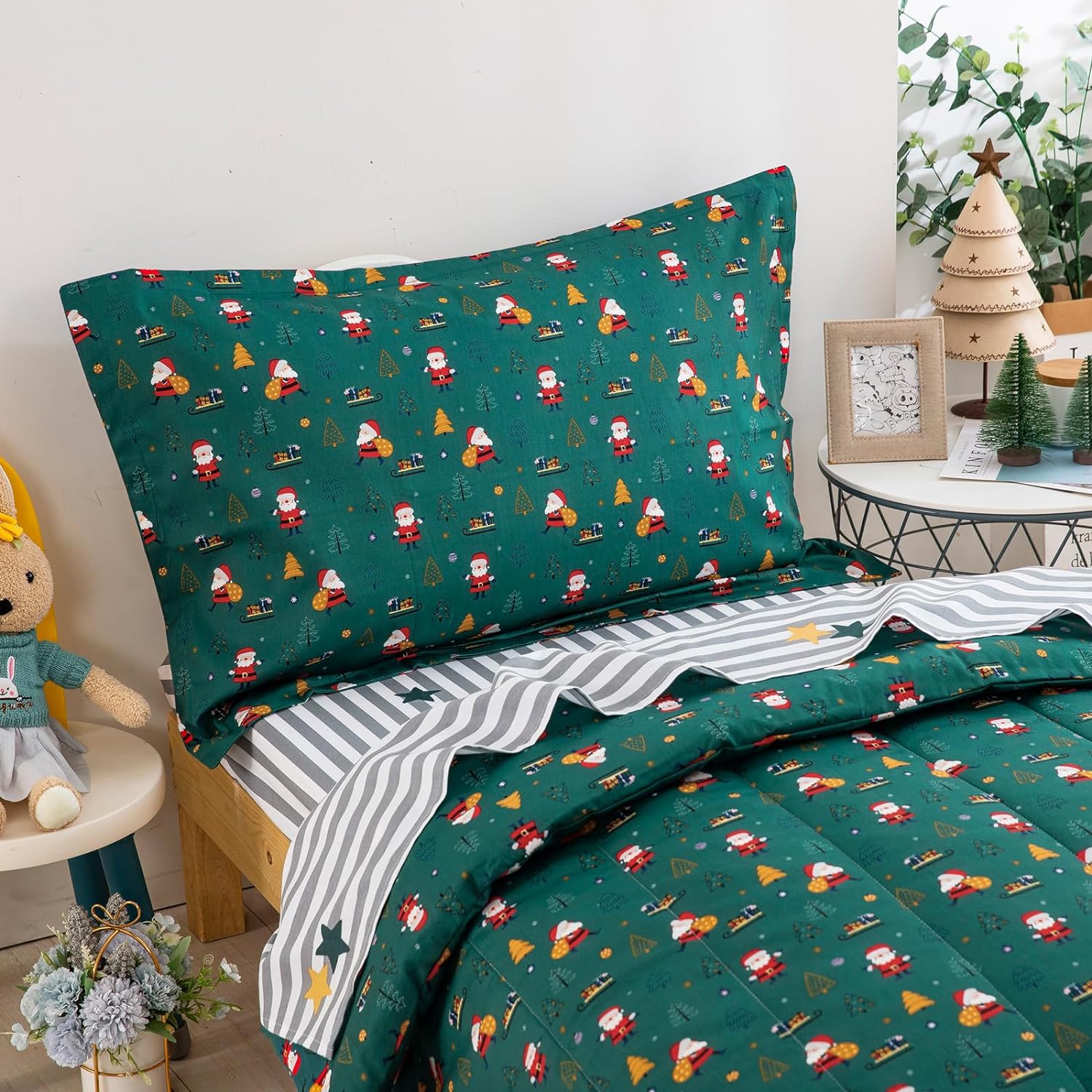
Mixing & Matching
A bit of eclecticism can personalize a room. Mixing and matching is an art that can transform a room.
- Contrasting Colors: Start with a base color from your toddler’s favorite bedding set and add contrasting pillowcases or sheets. For example, if the primary color is blue, pops of yellow or orange can make the bedding pop. It gives it depth and breaks the monotony.
- Textures & Layers: It isn’t only colors or patterns; it is about relationships. Textures are also important here. Take a plain cotton fitted sheet and a thick, velvety quilt. Or a linen duvet cover with fluffy, fur-like pillows. These combinations appeal to the tactile senses and make the bed inviting.
- Pattern Play: Do not be afraid to mix patterns. Stripes with polka dots or florals with geometric patterns work well if they share a color palette. The trick is not to have one pattern dominate the other.
Styling toddler bedding is more than just aesthetics. It is about creating a space which speaks to your kid, and that mirrors their interests and personality. With the right themes and a bit of daring mixing and matching, a toddler’s bed could be the center of their room.
- Includes Adorable Quilted Flower Comforter, Green Plaid Fitted Sheet, Top Sheet, and Pillow Case
- Gentle Care of Babies
- 6 Motifs to Choose
How to Make a Dreamy Escape for Toddlers.
Styling a toddler’s bedding is more than just decoration. It is about creating a place where young imaginations can fly. It’s comfort, safety and visual stimulation all designed to give our little ones the best place to sleep, dream and grow. From hypoallergenic materials to themes, each choice creates an ambiance that affects their mood, sleep quality and even their cognitive development.
As parents, caregivers or guardians, we wish to offer the very best to our toddlers. And to them bedding is more than fabric; it’s a lifestyle. It is a canvas of dreams, a shield of comfort and a testimony of our care and love. So the the next time you pick up a sheet, quilt or pillow, remember: you aren’t just decorating a bed; you are a designer. you’re crafting memories and ensuring well-being.

